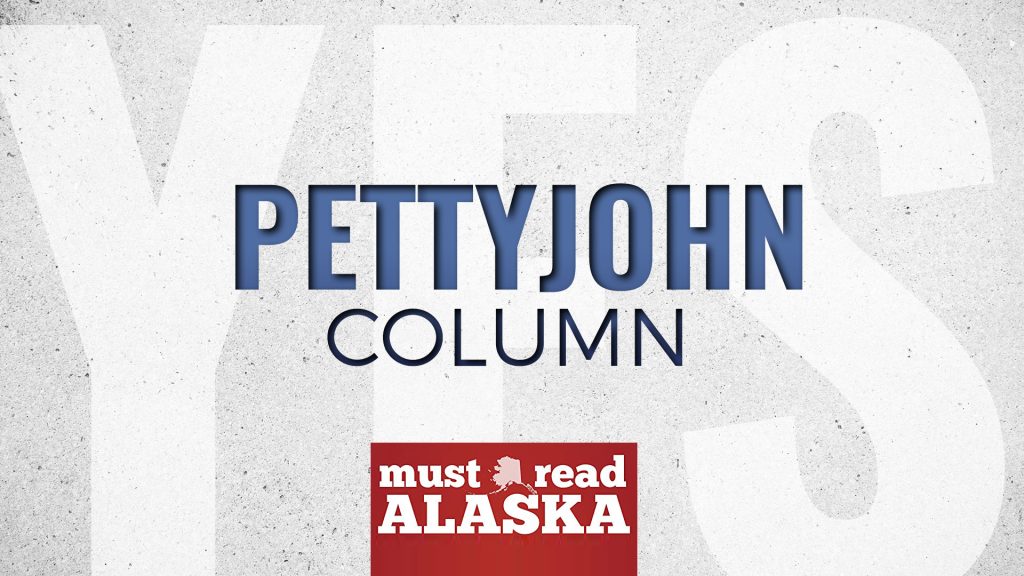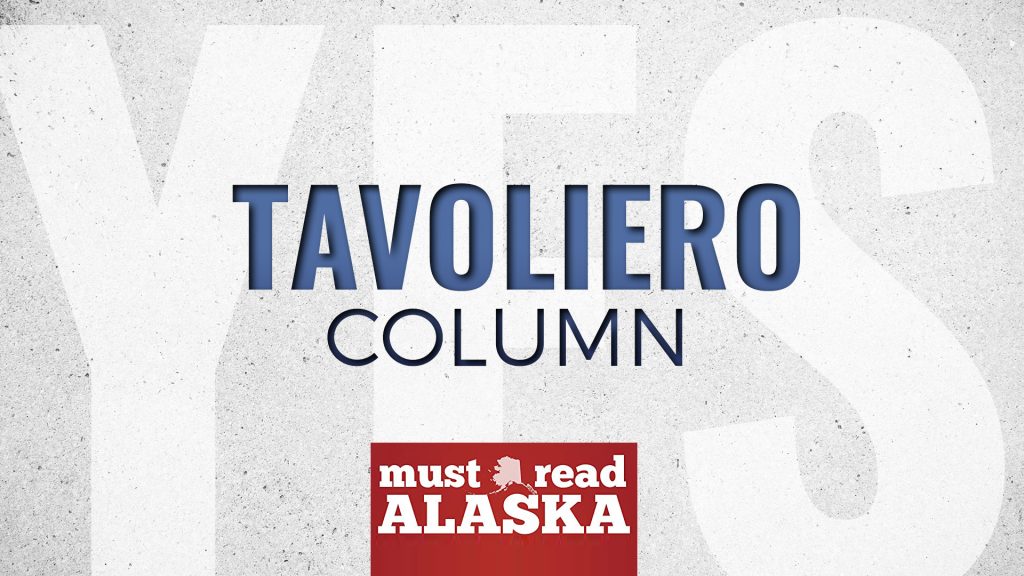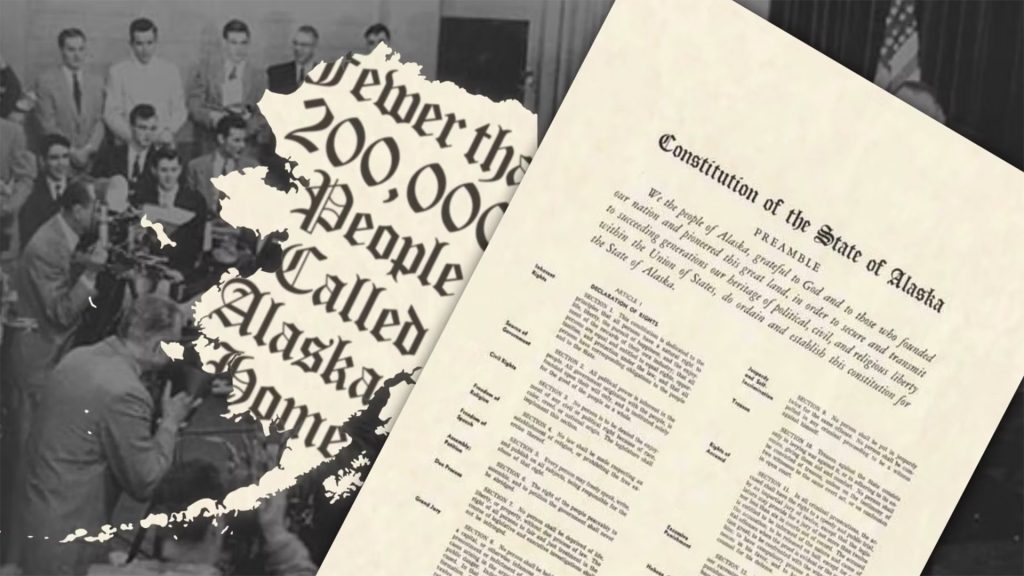The following column originally appeared on Must Read Alaska
Last Saturday I spent in Wasilla talking to forty or so pretty die-hard seniors about the the next Alaska constitutional convention. Many were not convinced that the convention would actually happen. I was a speaker along with Sen. Mike Shower, likely the most conservative member of the Alaska Senate.
Combined, our purpose was to educate folks as to why a constitution convention was necessary.
The Legislature when it addresses constitutional matters must have a two-thirds super majority to pass a bill to add or delete provisions of the Constitution. If I were among those who think the Constitution is perfect, I would oppose the passage by voting no on the November ballot on Proposition #1. I did so for the last four decades. But this year I’m going to advocate and vote yes.
In preparation for the talk, I reread the Alaska Constitution from the first word to the last word. I noted those provisions which could require some amendment and here they are:
Article I – Declaration of Rights
§ 22. Right of Privacy
§ 22. Right of Privacy
The right of the people to privacy is recognized and shall not be infringed. The legislature shall implement this section. [Amended 1972]
Article IV – The Judiciary
§ 8. Judicial Council
The judicial council shall consist of seven members. Three attorney members shall be appointed for six-year terms by the governing body of the organized state bar. Three non-attorney members shall be appointed for six-year terms by the governor subject to confirmation by a majority of the members of the legislature in joint session. Vacancies shall be filled for the unexpired term in like manner. Appointments shall be made with due consideration to area representation and without regard to political affiliation. The chief justice of the supreme court shall be ex-officio the seventh member and chairman of the judicial council. No member of the judicial council, except the chief justice, may hold any other office or position of profit under the United States or the State. The judicial council shall act by concurrence of four or more members and according to rules which it adopts.
Article VII – Health, Education and Welfare
§ 1. Public Education Public Education
The legislature shall by general law establish and maintain a system of public schools open to all children of the State and may provide for other public educational institutions. Schools and institutions so established shall be free from sectarian control. No money shall be paid from public funds for the direct benefit of any religious or other private educational institution.
Article VIII – Natural Resources
§ 1. Statement of Policy
It is the policy of the State to encourage the settlement of its land and the development of its resources by making them available for maximum use consistent with the public interest.
§ 2. General Authority
The legislature shall provide for the utilization, development, and conservation of all natural resources belonging to the State, including land and waters, for the maximum benefit of its people.
§ 3. Common Use
Wherever occurring in their natural state, fish, wildlife, and waters are reserved to the people for common use.
Article IX – Finance and Taxation
§ 7. Dedicated Funds
The proceeds of any state tax or license shall not be dedicated to any special purpose, except as provided in section 15 of this article or when required by the federal government for state participation in federal programs. This provision shall not prohibit the continuance of any dedication for special purposes existing upon the date of ratification of this section by the people of Alaska. [Amended 1976]
§ 13. Expenditures
No money shall be withdrawn from the treasury except in accordance with appropriations made by law. No obligation for the payment of money shall be incurred except as authorized by law. Unobligated appropriations outstanding at the end of the period of time specified by law shall be void.
§ 15. Alaska Permanent Fund
At least twenty-five per cent of all mineral lease rentals, royalties, royalty sale proceeds, federal mineral revenue sharing payments and bonuses received by the State shall be placed in a permanent fund, the principal of which shall be used only for those income-producing investments specifically designated by law as eligible for permanent fund investments. All income from the permanent fund shall be deposited in the general fund unless otherwise provided by law. [Amended 1976]
§ 16. Appropriation Limit
Except for appropriations for Alaska permanent fund dividends, appropriations of revenue bond proceeds, appropriations required to pay the principal and interest on general obligation bonds, and appropriations of money received from a non-State source in trust for a specific purpose, including revenues of a public enterprise or public corporation of the State that issues revenue bonds, appropriations from the treasury made for a fiscal year shall not exceed $2,500,000,000 by more than the cumulative change, derived from federal indices as prescribed by law, in population and inflation since July 1, 1981. Within this limit, at least one-third shall be reserved for capital projects and loan appropriations. The legislature may exceed this limit in bills for appropriations to the Alaska permanent fund and in bills for appropriations for capital projects, whether of bond proceeds or otherwise, if each bill is approved by the governor, or passed by affirmative vote of three-fourths of the membership of the legislature over a veto or item veto, or becomes law without signature, and is also approved by the voters as prescribed by law. Each bill for appropriations for capital projects in excess of the limit shall be confined to capital projects of the same type, and the voters shall, as provided by law, be informed of the cost of operations and maintenance of the capital projects. No other appropriation in excess of this limit may be made except to meet a state of disaster declared by the governor as prescribed by law. The governor shall cause any unexpended and unappropriated balance to be invested so as to yield competitive market rates to the treasury. [Amended 1982]
Rather than have a debate based upon fear of consequences of change, let’s debate and cost out each of the sections. According to the rules we will operate under, each provisional change will require the positive vote of 50% + 1 to pass the convention delegates. After that passage, all the voters of Alaska will then have to vote in a majority to pass the amendment.
My list is a beginning, not an end. Others may want other changes. I trust Alaska voters to know the right from the wrong. What I’ve heard from Alaska voters for decades, is that Alaskans want less government in their lives. Here’s your chance. When special interests replace the will of the people, the people must react and correct those errors.
The Constitutional Convention gives each of us the opportunity to bring the operations of government back to its Constitutional mandate. As stated in Section Two of the current Constitution “Source of Government – all political power is inherent in the people. All government originates with the people, is found upon their will only, and is instituted solely for the good of the people as a whole.”
If you want to understand if we need a convention, just look at one example, the Alaska Permanent Fund. Legislators made a futile quests for a solution to the dividend. Each failed. 80% of Alaskans, as owners, want the dividend protected and calculated under the existing statute: earnings averaged over five years divided by the number of Alaskans who qualify. Instead, convention opponents, led by former Sen. Cathy Giessel, Rep. Bryce Edgmon and former Gov. Bill Walker espouse the special interests mantra “whatever is left over is what the people get for their dividend.”
The only way to beat the special interests and take back the power for the people is to pass a constitutional amendment to give Constitutional protection the people deserve.
Let’s let the great debate begin.
Jim Crawford is the former President of Permanent Fund Defenders, pfdak.com, an Alaska based educational nonprofit corporation. Jim is a third generation, lifelong Alaskan who co-chaired the Alaskans Just Say No campaign to stop the raid on the Permanent Fund in 1999. He also served Governor Hammond as a member of the Investment Advisory Committee which formed the investment and corporate strategy of the Alaska Permanent Fund Corporation in 1975.





